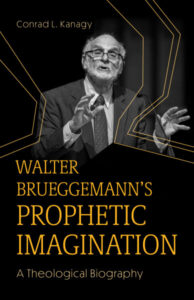Walter and Jim Wallis
Here’s another excerpt from Conrad L. Kanagy’s upcoming biography entitled Walter Brueggemann’s Prophetic Imagination: A Theological Biography.
Preorder here:
Subscribe to get notified as additional excerpts are posted.
At the same time as Brueggemann was writing, Jim Wallis and other students at Trinity Theological Seminary were looking for a biblical response to the turmoil and injustice they were living in. They responded by forming a magazine, creating an intentional community, and becoming socially active. In 1975, they moved to Washington, DC, and changed their name to Sojourners. Their profile expanded and they discovered a population of like-minded folks who were dissatisfied with the response of the church on both the Left and the Right, progressive and conservative. Though no one remembers how it happened, Brueggemann would write “Better Governance,” his first essay in Sojourners magazine, in November 1983.
Little did Walter and Jim know that this was the beginning of a forty-year journey in which two individuals from very different paths but with the same passions would find their way together. One was more a theologian and poet and the other more an author/activist, but they spoke the same language, they had the same concerns, and they had the same commitments. They were a great tandem. Walter Brueggemann’s writing was just the answer that folks like the Sojourners’ crowd was looking for: a prophetic voice who took the biblical text seriously; a theologian whose target audience was the church; a scholar who could write without the need to prove his credentials by using jargon and technical language of the academy; a Christian whose faith commitments saw justice as central to his faith. Over the next forty years, Walter would write forty-three articles for Sojourners magazine.
The two had grown up differently. Walter was born in rural Missouri in 1933. A descendant of German immigrants out of the Prussian Union, and Jim was born fifteen years later in Detroit, Michigan. Walter was a member of the Evangelical Synod of North America and Jim of the Plymouth Brethren. Both came from reform traditions shaped by the fatigue of religious quarrels. The Prussian Union formed in 1817 as a forced merger of Calvinists and Lutherans; the Plymouth Brethren originated in 1825 in Dublin, Ireland, reacting to feuds between Methodists, Anglicans, and Baptists. In their reactions, both prioritized the Scripture and simple obedience to it. Both reacted against the organized and institutional nature of the church. The Plymouth Brethren did away with formal ministry altogether, while most Synod pastors had little education and were not highly esteemed. Both grew up with some skepticism of the church. And both had early concerns about racial and social justice. Walter went to the local Black church as a teenager; at fifteen or sixteen, growing up in Detroit, Jim felt like something was very wrong, and nobody was talking about it in his white world. He asked the people around him why white people in Detroit lived such different lives from people in Black Detroit. When he asked questions, the answers were “you’re too young to ask these questions,” or “we don’t know why it’s that way,” or “if you keep asking these questions, you’re going to get into a lot of trouble.” So Jim took his questions into the inner city and got work alongside young Black men and in factories. He listened to their stories and went to Black churches, seeking answers from Black church leaders. The partnership between Wallis and Brueggemann deepened Wallis’ theological grounding and provided application of Brueggemann theology to contemporary issues of social justice. And together they amplified the other’s prophetic voice.

0 Comments